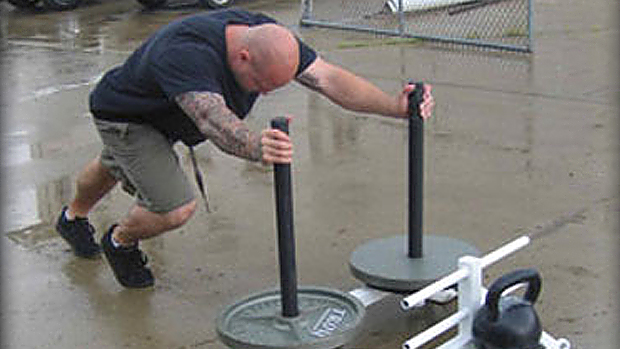You know those days when you feel like your training legs are
being cut out from underneath you? You'll hear multiple
reasons explaining why your training failed, but nothing explains
how mentally and physically exhausted you are.
We often fail to realize one basic physiological truth: Our
adrenal glands influence all of the major physiological processes
in our body. That's an undeniable truth. Our adrenal glands control
everything that happens and affects us in training. In fact,
controlling adrenal fatigue could help you achieve that physique
transformation you've been striving for.
The What Glands?
Leading adrenal gland authority, Dr. James L. Wilson, has
estimated that 80% of the world's population will experience
adrenal fatigue at one point. I've even seen current estimates
which state that 96% of the world is currently suffering from
it.
 |
The adrenal glands sit on top of the kidneys close to the spine
and just underneath the last rib. They're about the size of grapes.
Their location is very strategic since their purpose is to allow
for a rapid response to hormonal messages. Everything we do, from
drinking coffee to training, causes a hormonal rise in our
body.
The hormones signaled by the adrenal glands strongly affect the
utilization of carbohydrates and fats, the conversion of fat and
protein into energy, the distribution of stored fat (in particular
around the waist and face), blood sugar peaks and valleys, and
healthy cardiovascular and gastrointestinal
function.
If that's not enough, the adrenal glands control the
anti-inflammatory and anti-oxidant hormones to reduce allergic
reactions to alcohol, drugs, medication, supplements, food, and
environmental allergens. Once you enter the age group of about 35
to 50 and beyond, the adrenal glands eventually become the major
source of sex hormones that circulate in the body in both men and
women.
Every little stressor, unless properly managed, reduces healthy
adrenal function. Changes occur in protein, carb, and fat
metabolism. In addition, fluid and electrolyte balance, heart
function, and sex drive all experience modifications at the
biochemical and cellular levels.
To hammer home the point, adrenal fatigue often lays the
groundwork for respiratory infections, allergies, rhinities,
asthma, frequent colds, fibromyalgia, chronic fatigue syndrome,
hypoglycemia, type II diabetes, autoimmune disease, and even
alcoholism. To sum it up, the ability to have sex, add muscle, burn
fat, and live healthy are acutely affected by the
adrenals.
That's deep, right?
10 Signs of Adrenal Fatigue
More or less every negative thing that happens to you
contributes to adrenal fatigue. It could be a death, loss of a job,
or some other major happening. The main issue, however, lies with
the simple everyday things that get us really annoyed: a toothache,
a strained romantic relationship, an ass for a boss, a chronic
cold, and even training.
When these little things go from acute to chronic, the
accumulation starts to quickly matter. Any time we burn the candle
at both ends we cause an over-stress to our body. I've seen
test results of people who seem happy, yet they have elevated
cortisol levels of 200-300%. Yeah, they're storing some pretty
stubborn lower ab fat!
 |
Adrenal testing is the first thing I do with clients. I do this
before a movement evaluation or anything else. I want to see how
healthy their adrenals are since the results are going to dictate
everything from their program design to specific nutritional
recommendations.
Here are some of the more accurate signs of adrenal
fatigue:
Sign #1: Difficulty getting up in the morning. It doesn't
matter the time, you just don't feel awake
enough.
Sign #2: Continuous cravings for salt or salty foods. You
always need more salt than you're getting.
Sign #3: Increased effort to do every day tasks. You love
training, but now it seems like everything from your warm-up to the
deadlift sucks.
Sign #4: Decreased sex drive. It just isn't happening.
Enough said.
Sign #5: Decreased ability to manage stress. The littlest
things seem to set you off.
Sign #6: Increased recovery time. Any cuts you have take longer
to heal, swelling stays around, that cough you've had is still
there after a month, and your biceps still hurt from loading the
bar when you were squatting.
Sign #7: Light-headedness from standing too quickly. You feel
like you're going to pass out and you see bright images when
you stand up.
Sign #8: Less overall life happiness. Nothing makes you
happy: training sucks, your job sucks, and the weekends suck.
Sign #9: Increased symptoms with skipped meals.
You're always hungry, every hour. If you miss a meal,
you're craving something and every meal becomes a cheat
meal.
Sign #10: Less productivity. Overall, you just can't
get things done, you're distracted easily, and you can't
work as efficiently or as quickly.
Training Impact
All of the above stuff doesn't mean much unless it's
relevant to getting jacked or ripped, so here's why it
matters. We've all heard of that nasty thing called cortisol that eats up muscle tissue, right? One of the main
functions of the adrenal glands is to regulate cortisol secretion
and not allow too much to be released.
Unfortunately for most of us, under both acute and chronic
stress situations we over-secrete cortisol since our adrenal glands
are too fatigued to perform properly. Any little increase in
cortisol will cause fat to be stored preferentially around our
waist – say good-bye to your lower abs.
As if that isn't bad enough, adrenal fatigue also has an
effect on our blood sugar levels. If cortisol helps to keep our
blood sugar at appropriate levels to meet our energy demands, then
once cortisol drops due to adrenal fatigue, our body can't maintain
adequate blood sugar levels.
A quick drop in blood sugar then affects our ability to store
nutrients where we'd like and creates a state of insulin
resistance in the muscle cell. Now we're storing nutrients as
fat, and since we have a rapid state of hypoglycemia, we're
more likely to cheat on our diet and eat whatever we crave.
To throw more fuel on the fire, 80% of individuals suffering
from adrenal issues also suffer from some type of decreased thyroid
function. Most people who have a low thyroid are unresponsive to
thyroid medications, and in order to get better the adrenals have
to be supported. We'll also see a sudden increase in allergies
and joint pain since cortisol is the most powerful
anti-inflammatory in the body. Cortisol drops and our response is
an inflammatory reaction that increases the severity of our
allergies and joint pain.
Remember that one of the signs of adrenal fatigue is a craving
for salt. Well, we're more than likely going to resort to some
type of salty food to curb the craving. It's worth repeating
again that insulin controls everything and all of our other
hormones follow insulin's lead.
You'll often see advice from armchair experts telling us to
just eat unrefined carbs, but it's not that easy. We literally
can't eat that food because our body doesn't allow it.
I'm not trying to make adrenal fatigue a scapegoat for the
laziness in the failed diets out there, but we need to treat the
underlining issue.
Adrenal Smackdown
Now that we have a clear understanding of what adrenal fatigue
is and how it affects us, we need to know what to do about it. I
won't make any outlandish claims, but if we take the right
steps in handling adrenal insufficiency, the gains will come easier
and quicker.
Honestly, there's no overnight fix; no step-by-step process
exists. I have multiple protocols that I use with my clients on a
regular basis, but fixing adrenal fatigue is a consistent,
sustained effort.
1) Lifestyle
It's not the sexiest choice, but until a serious attempt at
de-stressing our lives takes place, we're not going to
recover, no matter how much we modify our nutrition and training.
Simply put, we need to do something every day to relax ourselves.
 |
Adrenal fatigue is a result of continued stress that we
experience in our daily life. Most of us just get frustrated and
try to deal with it as best we can. There are things we can't
change, but we can control our reaction to them.
Having daily activities that relieve us of stress is a must. If
you have people around you that zap you of your positive energy,
you need to get away from them. Generally speaking, most people are
negative and they don't like to see others get ahead and are
quick to call you irrational. So just try to spend five minutes
doing something you like everyday.
2) Meal Timing
In this situation, meal timing is as important as what you eat.
Your circadian rhythm is your internal body clock that regulates
cortisol values over a 24 hour period. Our peak cortisol times come
when we wake up (since cortisol is low-grade adrenaline that rises
to tell you to wake up), at 10:00 AM, 3:00 PM, and at the beginning
of our sleep cycle.
 |
Having adrenal fatigue will cause higher than normal cortisol
peaks during these times, so it's necessary that we find
ourselves consuming the proper nutrients then. Have you ever
noticed how you get tired at 10:00 AM and 3:00 PM? Most of us will
attribute it to the blood sugar crashes from the common American
diet. While that might be true, again there's an underlining
issue.
3) Macronutrients
When dealing with adrenal fatigue, it's not as easy as
upping protein, upping fat, and dropping carbs. We have to look
into each nutrient further.
Protein
The main issue with protein in people suffering from adrenal
fatigue is that they also have lower levels of the hydrochloric
acid (HCL) that's needed to break down the protein. As a result,
typical high protein meals that are consumed when attempting to add
size or drop body fat will typically leave you bloated, gassy, or
increase the feeling of heaviness in your stomach.
Most of us then turn to more carbohydrates, since they're
protein sparing and further aggravate the adrenal fatigue. We want
to keep the protein high, but we must increase our HCL
intake.
Carbohydrates
We need to make sure our carbohydrates come from fibrous
sources. Our first step is to limit sugars and include fruits.
Whether it's glucose or fructose, our body doesn't handle
sugar as well during times of adrenal insufficiency. The majority
of our carbs should actually come from rice and vegetables in the
beginning stages.
Note that oatmeal and yams are fibrous carbs, but they tend to
be very hyper allergenic to some of us. After about four to six
weeks, I'll slowly begin to add oatmeal and yams into the
diet. The most important thing to remember is to eliminate all
sugar from your diet if you suffer from this.
 |
Fats and Oils
Fats and oils should be heavily relied on during adrenal
recovery periods. Our total Testosterone is lower and our free
Testosterone is bound up in cases of adrenal fatigue, so we'll
need fats to increase Testosterone production.
Our first choice is going to be an omega-3 supplement. I prefer
Flameout, since the
combination of omega-3's and CLA has been shown to increase
insulin sensitivity.
We also need to get our fats through various seeds such as
sesame, pumpkin, and sunflower. Some acceptable nuts include
cashews, almonds, and walnuts.
Supplements
Most trainers or coaches go out of their way to tell people to
forget about supplements and just train hard. Under situations of
adrenal stress, this just isn't going to happen without the
proper nutrients to restore adrenal health. Some of the better
supplements are:
1. Essential Fatty Acids
Again, it's vitally important that we consume high amounts of
healthy fats when we're attempting to recover from adrenal
fatigue. A combination of omega-3 fatty acids and CLA found in
Flameout should be the first line of defense. Not only does it
lower the insulin response during and after the meal, but essential
fatty acids also help to reduce cortisol when it gets too
high.
2. B Vitamins
The entire B complex is needed throughout the day to deal with
the adrenal cascade. B vitamins can be thought of as the gas to
fuel the adrenal car. Specifically, we should individually
supplement with B5, B6, and Niacin.
B5, necessary for the conversion of glucose to energy, is
present in all cells but in higher quantities in the adrenal
glands. B6 and Niacin are both important in several of the
enzymatic pathways in the adrenal cascade.
3. Zinc and Magnesium
Both zinc and magnesium act as a sparkplug of sorts for your
adrenal glands in that they're involved in the energy production in
every cell in the body. Several energy-producing steps depend on
zinc and magnesium, and since a stressful environment is created in
the body when these nutrients are deficient, it's essential to
supplement with them. ZMA is a good
choice.
4. Adaptogenic Herbs
An adaptogenic herb is any substance that helps the body to
function closer to its normal levels. Nutrients like licorice root,
rhodiola rosea, and various ginsengs all help the body to cope with
stress and they balance out natural hormonal processes. These
specific herbs can help to normalize blood sugar, decrease
cortisol, and increase IGF-1. If we're training for an
anabolic response, we need to do our best to make sure we're
getting the most we can naturally.
As always, there's a flipside and there are certain
supplements that we want to run from. Supplements like yohimbine,
caffeine, ephedra, or any type of stimulant isn't going to do
jack for us if we have adrenal fatigue. That means we also have to
stay away from coffee or tea.
This is typically very hard for most of us to understand, since
we all want to lose weight. Ephedra makes it nearly impossible to
naturally see your lower abs. These stimulants provide a quick
pick-up to your adrenal glands and cause an over-secretion of
cortisol.
Training
Dealing with adrenal issues isn't all nutrition related. A
big percentage of adrenal health or lack thereof can be directly
attributed to training program design.
When you look at the hormonal responses following both higher
volume and lower volume training, you see noticeable hormonal
differences. This brings about the need to modify sets/reps and
intensity on a daily basis. Too many people are volume-based and
since most usually perform a body part split, they have no problem
coming in the next day and hitting another muscle since they have
more local fatigue.
Undulating periodization is a way to start, but we should
essentially have two hard and two light/speed days where our
intensity is nowhere near the previous day. The biggest offender to
adrenal fatigue is training consistently to failure, which actually
suppresses proper adrenal function. I'm not the first to say
it, but don't train to failure, ever.
Here are some rules of program design you should follow when
treating adrenal fatigue:
Rule #1: Separate the two heavy days by at least three days
– two days off and one light day.
Rule #2: Limit the amount of eccentric (negative)
training.
Rule #3: Eliminate the use of intensity methods such as drop
sets, pre/post fatigue, etc.
Rule #4: Stick with full body movements and their
variations.
 |
Rule #5: Focus on incomplete rest periods to minimize total
training time.
Rule #6: Absolutely forego all steady-state aerobic work and
limit intervals to two or three times per week.
Rule #7: Include less overall total volume on the light/speed
days.
The Final Word
Adrenal fatigue has only been scantly discussed in physique
circles until now, but hopefully you realize the impact it has on
building a perfect body. You'd be surprised to see how well
your training responds once you treat adrenal fatigue!




